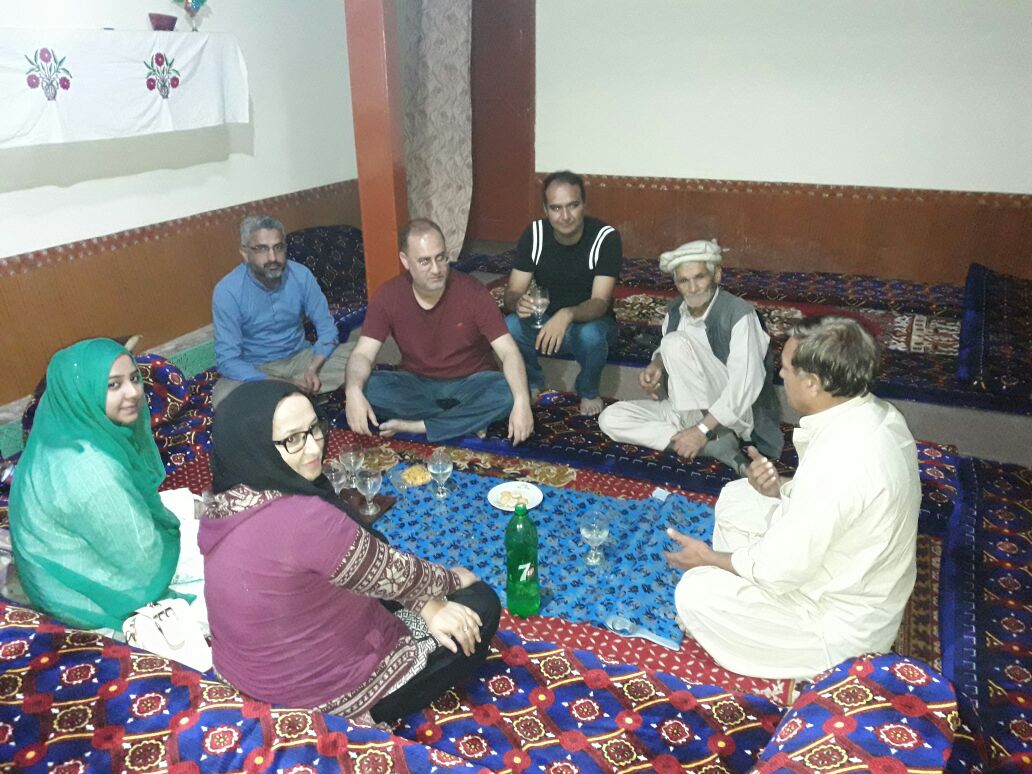The Dawoodi Project
 UAJK team with Dawoodi speakers: (back, L to R) Sabir Hussain Shah, Dr. Abdul Qadir
Khan, Zafeer Hussain Kiani, Dawoodi speaker Rehmat Ali; (front, L to R) Ayesha Bukhari,
Ayesha Rehman and Dawoodi speaker Ali Gohar.
UAJK team with Dawoodi speakers: (back, L to R) Sabir Hussain Shah, Dr. Abdul Qadir
Khan, Zafeer Hussain Kiani, Dawoodi speaker Rehmat Ali; (front, L to R) Ayesha Bukhari,
Ayesha Rehman and Dawoodi speaker Ali Gohar.
The Dawoodi Language Project is a joint venture between two universities: San José State University (SJSU) in San José, California and the University of Azad Jammu and Kashmir (UAJK) in Muzaffarabad, Pakistan. Together, they put together a multi-year project to record and transcribe spoken Dawoodi with two goals in mind, to preserve the language before it disappears and create a permanent record for future generations of speakers and linguists alike. The project was supported by a grant from the Documenting Endangered Languages (DEL) Program at the National Science Foundation.
The binational team consists of two faculty members from each university, Drs. Roula Svorou and Chris Donlay from SJSU and Drs. Ayesha Sohail and Abdul Qadir Khan from UAJK, along with graduate students from the latter institution: Ayesha Bukhari, Nabeela Khalid, Zafeer Hussain Kiani, Ayesha Rehman, Sabir Hussain Shah and Hamid Zia. In addition, two native speakers, Mehraj Hussain from Hunza Valley and Haider Abbas from Nagar Valley relocated to Muzaffarabad to work with the UAJK team – without them this project would not have been possible. The UAJK team carried out the field visits, made the audio and video recordings and, with the native speaker consultants, transcribed the recordings and analyzed the language. The SJSU team provided fieldwork training and long-distance collaboration and support.
Dawoodi speaker Ali Gohar works with Zafeer Kiani from the UAJK team.
There were two field visits to both the Hunza and Nagar Valleys during the summers of 2017 and 2018. More than 25 hours of audio and video recordings were made, featuring a variety of genres, such as word lists, stories, personal histories, conversations and songs. Dawoodi speakers, ranging in age from 21 to 96, generously shared their time and knowledge with us, and we thank here all who participated – from Hunza Valley: community leader Habibullah Jan, Alam, Alam Jan, Ali Gohar, Begum, Bibi, Bibi Hali, Bibi Neelum, Bibi Shirini, Darwesh Ali, Farman Ali, Fatima Farman, Fida Ali, Ghulam Hussain, Ghulam Qadir, Gul Dawood, Gulzari, Hamid Karim, Ibraheem, Karim Jan, Mahida, Manzoor Hussain, Maryam Bibi, Mehr Bano, Mola Madad, Parveen, Rasheeda, Rehmat Ali, Rehmat Karim, Shadana and Shakila; and from Nagar Valley: Ali Gohar, Ali Haider, Chushman Bibi, Fatima Nek Alam, Haseen Bano, Shaban Ali, Shaban Ali Lohar, Shahida Bibi, Shakoor Ali, Suleman, Yousaf Ali, Zara Bano and Zubaida Bibi.
We dedicate these pages to them with gratitude and friendship.